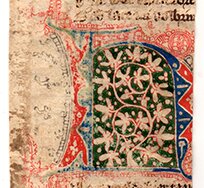
American collector donates centuries-old strip of parchment to University of Antwerp
An American collector has donated a fragment of a fourteenth-century manuscript in medieval Dutch to the University of Antwerp. The strip of parchment contains verses from an unknown story about Alexander the Great. “My jaw dropped to the floor when I saw the photographs”, says Professor Remco Sleiderink.
Farley P. Katz is a successful lawyer in San Antonio, Texas. He specialises in tax law, but his real passion is collecting handwritten books from the Middle Ages. Any manuscripts and fragments he can get his hands on, he always tries to examine thoroughly first. Then he and his wife Carolyn Fuentes donate these medieval sources to libraries, where they can be studied in more detail.
In the past, Katz and Fuentes have made donations to the prestigious University of California (UCLA), and to the Bancroft Library in Berkeley. The Special Collections Department of the University of Antwerp is the first European library the couple have chosen to collaborate with. “I felt that this Middle Dutch fragment would be best appreciated if it returned home”, says Katz.
A great deal has been lost
We don’t know how the fragment ever made it to the United States. It probably stowed away in the binding of a printed book. In the early book printing era (the fifteenth and sixteenth centuries) many medieval manuscripts were cut up and used to make book bindings. Many Middle Dutch manuscripts and texts were lost this way. Fragments are therefore of tremendous value for the reconstruction of literary history.
The parchment strip donated to the University of Antwerp contains more than 70 verses in Middle Dutch. In these verses, a first-person narrator links together various stories about Alexander the Great, including the story of the conquest of Gaza in the fourth century BC. Until now, nobody knew that there was a Middle Dutch version of this story. It probably goes back to a French source, the Roman d’Alexandre. It remains unknown who wrote the Middle Dutch verses.
Quality copyist
Remco Sleiderink, professor of Middle Dutch Literature at the University of Antwerp, had to pick up his jaw from the floor after seeing photos of the fragment sent to him by e-mail this spring. “The fragment proves that the Middle Dutch storytelling tradition surrounding Alexander the Great was richer than my fellow researchers and I had previously thought. It also sheds a special light on medieval book production in the former duchy of Brabant.”
On the basis of the letter shapes, Sleiderink was able to establish that the manuscript was made by the same scribe who was also responsible for the Romance of Fergus (Roman van Ferguut), a manuscript that is kept in Leiden. In recent years, several fragments have been linked to this ‘Ferguut scribe’. He must have worked as a professional scribe or copyist in a city in Brabant such as Brussels, Leuven or Antwerp around 1325-1350. Carefully written in fine handwriting with a wide line spacing and diligently decorated with penwork and a colourful initial, the new fragment not only underscores the quantity, but also the quality that this professional scribe was able to deliver.
Fragment to be digitised
Rector Herman Van Goethem and head librarian Trudi Noordermeer are very grateful that Farley P. Katz and his wife donated the fragment to the Special Collections of the University Library.
“The fragment is kept in a handmade acid-free box in a fireproof safe at the Special Collections Department”, explains Noordermeer. “The ink has faded away in some spots, but the parchment is in good condition. On special occasions, like a Heritage Day, it can also be shown to the public. In the future, the document will be digitised and, of course, it is always available to researchers who study the material aspects of medieval manuscripts.”
The fragment will also play a role in the Dutch Linguistics and Literature programme. Remco Sleiderink and Dirk Schoenaers (UCLL are currently working on an edition and further study of the fragment.
Farley P. Katz i, an American collector has donated a fragment of a fourteenth-century manuscript in medieval Dutch to the University of Antwerp.
